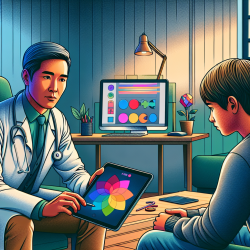Adolescents with mental health issues are particularly vulnerable to engaging in high-risk sexual behaviors. These behaviors can lead to unplanned pregnancies and sexually transmitted infections (STIs), which have significant implications for their physical and emotional well-being. A recent study published in the Journal of Child and Family Studies explores the feasibility and acceptability of implementing technology-supported sexual health education among adolescents receiving inpatient psychiatric care. This blog post aims to provide practitioners with insights on how they can enhance their skills by adopting the findings from this research.
The Importance of Sexual Health Education in Psychiatric Settings
Mental illness during adolescence is often associated with risky sexual behaviors, such as inconsistent condom use and multiple sex partners. Inpatient psychiatric units present a unique opportunity to provide structured sexual health education to adolescents who might otherwise miss out on this crucial information. The study by Olmsted et al. (2022) highlights the potential of using online modules to deliver this education effectively.
Key Findings from the Study
- The program was highly acceptable to youth, with 84-89% liking the modules and 98-100% finding them easy to use.
- Youth showed improvements in attitudes towards violence, intentions to use birth control, condom knowledge, self-efficacy, and beliefs about condoms.
- The intervention was feasible to administer within the inpatient setting and well-received by nursing staff.
Implementing Online Modules: Practical Steps for Practitioners
The study provides a roadmap for practitioners looking to integrate similar interventions into their practice:
- Select Appropriate Modules: Choose modules that cover essential topics such as healthy relationships, pregnancy prevention, condom use, and STI prevention.
- Create a Supportive Environment: Ensure that adolescents have access to a quiet space and necessary technology (e.g., laptops, headphones) to complete the modules.
- Engage with Staff: Involve nursing staff and other healthcare professionals in the process to facilitate smooth implementation and support for patients.
- Monitor and Evaluate: Regularly assess the usability and impact of the modules through feedback from participants and staff.
The Role of Further Research
The pilot study indicates that online sexual health education is both feasible and beneficial in psychiatric settings. However, larger studies are needed to fully understand its impact on long-term behavioral outcomes. Practitioners are encouraged to engage in further research or collaborate with academic institutions to refine these interventions.
This approach not only enhances practitioner skills but also contributes significantly to improving adolescent health outcomes. By leveraging technology in therapeutic settings, we can ensure that vulnerable populations receive comprehensive sexual health education tailored to their needs.










